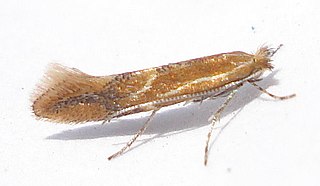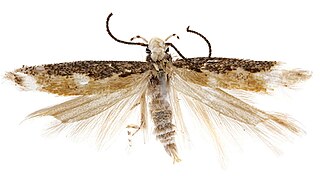
The Elachistidae are a family of small moths in the superfamily Gelechioidea. Some authors lump about 3,300 species in eight subfamilies here, but this arrangement almost certainly results in a massively paraphyletic and completely unnatural assemblage, united merely by symplesiomorphies retained from the first gelechioid moths.

Gelechioidea is the superfamily of moths that contains the case-bearers, twirler moths, and relatives, also simply called curved-horn moths or gelechioid moths. It is a large and poorly understood '"micromoth" superfamily, constituting one of the basal lineages of the Ditrysia.

The Batrachedridae are a small family of tiny moths. These are small, slender moths which rest with their wings wrapped tightly around their bodies.
The Cosmopterigidae are a family of insects in the order Lepidoptera. These are small moths with narrow wings whose tiny larvae feed internally on the leaves, seeds and stems of their host plants. About 1500 species are described. The taxonomic family is most diverse in the Australian and Pacific region with about 780 species.

Urodidae or "false burnet moths" is a family of moths in the lepidopteran order. It is the type genus in the superfamily, Urodoidea, with three genera, one of which, Wockia, occurs in Europe.

Anacampsis is a worldwide genus of moth with most found in the nearctic and neotropical regions. It is in the family Gelechiidae. The larvae feed on a range of deciduous trees and shrubs in a rolled or folded leaf, or spun shoot.
Ascalenia is a genus of moths in the family Cosmopterigidae.

Ethmia is a large genus of small moths. It is the type genus of the gelechioid family Ethmiidae, which is sometimes included in Elachistidae or Oecophoridae as subfamily.

The Depressariinae – sometimes spelled "Depressiinae" in error – are a subfamily of moths in the superfamily Gelechioidea. Like their relatives therein, their exact relationships are not yet very well resolved. It has been considered part of family Elachistidae sensu lato or included in an expanded Oecophoridae. In modern classifications they are treated as the distinct gelechioid family Depressariidae.

Stigmella is a genus of moths of the family Nepticulidae. The genus was erected by Franz von Paula Schrank in 1802.

Depressaria is a moth genus of the superfamily Gelechioidea. It is the type genus of subfamily Depressariinae, which is often – particularly in older treatments – considered a distinct family Depressariidae or included in the Elachistidae, but actually seems to belong in the Oecophoridae.

Phyllonorycter is a genus of moths in the family Gracillariidae.
Coleophora salicorniae is a moth of the family Coleophoridae. It is found in most of Europe, including the Mediterranean islands and Cyprus. It is also known from central Asia, Iran and the Canary Islands. It occurs in desert biotopes and salt-marshes.
Microcolona is a genus of moths of the family Elachistidae described by Edward Meyrick in 1897.

Agonopterix is a moth genus of the superfamily Gelechioidea. It is placed in the family Depressariidae, which was often – particularly in older treatments – considered a subfamily of the Oecophoridae or included in the Elachistidae.

Epermenia is a genus of moths in the family Epermeniidae. The genus was first described by Jacob Hübner in 1825.

Gelechiinae is a subfamily of moths in the family Gelechiidae. It was described by Henry Tibbats Stainton in 1854.












